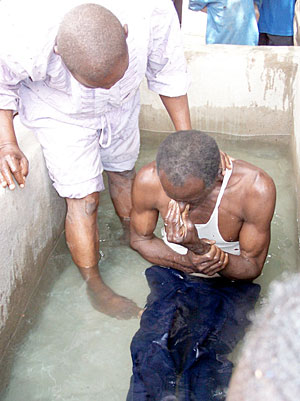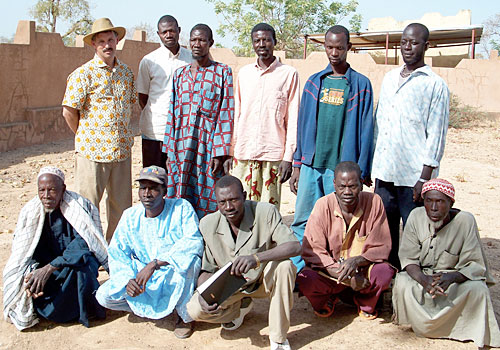Beulah Baptist Church in Hopkins, a rural area that is becoming part of the suburban sprawl of southeast Columbia, is challenging the notion that it takes a big church with abundant resources to reach out and directly touch people in a foreign land with the message of Christ.
 In a modified cattle trough, a pastor from the capital city of Bamako baptizes a new believer from “F-Village” in Mali, West Africa. F-Village (the true name withheld to protect the identities of new converts) is ground zero for an emerging indigenous church-planting movement envisioned by the congregation of Beulah Baptist Church in Hopkins.
In a modified cattle trough, a pastor from the capital city of Bamako baptizes a new believer from “F-Village” in Mali, West Africa. F-Village (the true name withheld to protect the identities of new converts) is ground zero for an emerging indigenous church-planting movement envisioned by the congregation of Beulah Baptist Church in Hopkins.Before 2007 is over, the modest congregation (averaging about 175 in Sunday school) will have sent teams to far-flung villages in Mali, West Africa, on five separate mission trips.
And that’s just the beginning. What started as just an idea during the 2006 annual meeting of the Southern Baptist Convention in Greensboro, N.C., has become a fledgling indigenous church-planting movement among the Bambara people of sub-Saharan West Africa.
When pastor Brad Bessent and three others from his church crossed the Atlantic in February 2007 on a “vision trip” to Mali, no one expected the vision to become a reality – and a spiritual imperative – so quickly. In the first village the team visited (which team members refer to as “F-Village” in order to protect the identities of converts), 15 Bambara people responded to the preaching of the gospel and became believers.
Upon returning to South Carolina, the vision team enthusiastically recommended to fellow church members that Beulah Baptist Church enter into a strategic partnership with the International Mission Board to work with the Bambara people. “We just had to go back,” Bessent said. “There’s no way we could leave them.”
The church agreed, and committed to send a team to the area every six weeks to assist the work of IMB missionaries in the region. Bessent said his church, through the work of a voluntary “impact team,” has assumed responsibility for the ongoing work in F-Village and nearby villages. The church has set aside funds to support the West Africa mission effort, but team members are responsible for raising their own funds for travel and personal expenses. Also, through love offerings, the church has provided funds for translators, vehicles and food. Columbia Metro Baptist Association has joined Beulah Baptist in the partnership, and members of other churches will be going on future trips, perhaps as soon as 2008, Bessent said.
 Recent Bambara converts in Mali, West Africa, have already begun sharing the gospel with people in neighboring villages. Also pictured, back row, left, is IMB missionary Steve Roach.
Recent Bambara converts in Mali, West Africa, have already begun sharing the gospel with people in neighboring villages. Also pictured, back row, left, is IMB missionary Steve Roach.In F-Village, team members from Beulah Baptist have been given land by the chief, and the new believers constructed a mud hut for the team, as the South Carolinians are no longer considered guests, but “resident friends,” Bessent said. Also, the village chief gave recent converts a plot of land for a future church building. There is now a viable church in the village with more than 30 baptized believers, and believers are sharing their faith with people in other villages in the area.
The Bambara people, whose native religion is a hybrid form of folk Islam, were the focus of the Lottie Moon Christmas Offering Week of Prayer in 2006. They number approximately 4 million, with fewer than 1 in 1,000 identifying themselves as Christian. “Please pray that God will continue to send forth laborers into this harvest,” said Bessent.
“This has crystallized and unified our church,” said Bessent. “Ours is a 200-year-old church that has never done anything like this. I think some of our people are amazed, and they are more aware of the lost in our own community. As a result, there is more of an emphasis on prayer.”